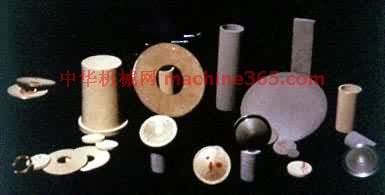1) Mesoporous M41S materials


中孔M41S材料
2) Mesoporous lamellar M41S


中孔层状M41S
3) mesoporous material


中孔材料
1.
Two kinds of forming mechanism,transcripion and cooperation,were elucidated,the methods to control the pore size of mesoporous materials were explained.
说明了通过调节表面活性剂链长、有机添加物、实验温度和反应时间以及助溶剂来控制中孔材料孔径大小的方法。
2.
Preparation of silica mesoporous materials in a thin film geometry was first reported in 1996.
以薄膜的形式仿生制备二氧化硅中孔材料于 1 996年首次报道。
3.
Since the MCM-41 molecular sieve has been prepared by the scientists of Mobil Oil successfully in 1992, the preparation and application of mesoporous materials has been the focus of research.
自从1992年Mobil公司的科学家们成功地制备出中孔MCM-41分子筛以来,中孔材料的合成及应用一直是人们研究和关注的热点。
4) mesoporous materials


中孔材料
1.
Characteristics of block copolymers (BC) as non-ionic surfactant, available block copolymers, and their performance as templating agent for the preparation of mesoporous materials were introduced.
介绍了嵌段聚合物作为非离子表面活性剂的性质、常用的嵌段聚合物种类,及其作为模板剂合成中孔材料和具有不同宏观形态的纳米级多孔器件的应用。
2.
This article reviews the recent research progress on the synthesis of mesoporous materials.
近几年中孔材料的研究非常活跃,本文对中孔材料合成的最新进展进行了综述。
3.
This article reviews the recent research progress on the application of mesoporous materials in several significant areas: catalytic application in organic and polymerization reactions, nanoreactor for polymerization, separation technology and enzyme immobilization, as well as nanocontainer or template for the fabrication of quantum structure.
对中孔材料在催化有机反应、高分子聚合反应、酶固定化、吸附分离以及中孔材料作为模板合成纳米材料等领域中应用的最新进展进行了综述。
5) mesoporous SiO_2


SiO_2中孔材料
6) mesoporous carbon materials


中孔炭材料
1.
Template synthesis and performance of ordered mesoporous carbon materials;


模板法制备有序中孔炭材料及其性能
2.
The mesoporous carbon materials with different specific surface areas was prepared using SBA-15 as a template and sucrose as a carbon source under different carbonized temperatures.
以SBA-15为模板,蔗糖为炭源,在不同的炭化温度下合成了不同比表面积的中孔炭材料。
补充资料:机械工程材料:粉末冶金多孔材料
用粉末冶金的方法製造的﹑内部结构为多孔的材料(或製品)﹐一般由球状或不规则形状的金属或合金粉末经成形和烧结製成﹐又称烧结多孔材料。这种材料为孔道纵横交错﹑互相贯通的多孔体﹐通常具有30~60%体积的孔隙度﹐孔径1~100微米。常用的金属或合金有青铜﹑不锈钢﹑铁﹑镍﹑鈦﹑钨﹑鉬以及难熔金属化合物等。做成的製品有坩堝状﹑碟状﹑管状﹑板状﹑薄膜等。粉末冶金多孔材料的特点是﹕孔径和孔隙度均可控制﹔优良的透过性能﹐且在使用后可以再生﹐因而使用寿命长﹔导热﹑导电﹔耐高温﹑耐低温﹑抗热震﹔抗介质腐蚀﹔比表面积大﹔可焊接和加工等。因此它的综合性能较传统的纸质﹑棉和化纤织品﹑陶瓷﹑玻璃﹑金属丝网等过滤材料为好。在现代技术中﹐多孔材料愈益发挥其重要作用﹐有两方面的主要用途。作过滤器用﹕利用其多孔的过滤分离作用净化液体和气体。例如用来净化飞机和汽车上的燃料油和空气﹔化学工业上各种液体和气体的过滤﹔原子能工业上排出气体中放射性微粒的过滤等。利用其孔隙的作用﹐製造多孔电极﹑灭火装置﹑防冻装置﹑耐高温喷嘴等。多孔电极主要在电化学方面应用。灭火装置是利用其抗流作用而防止爆炸﹐如气焊用的火焰防爆器等。防冻装置是利用其多孔可通入预热空气或特殊液体﹐用来防止机翼和尾翼结冰。耐高温喷嘴则是利用表面发汗而使热表面冷却的原理﹐被称为发汗材料。(见彩图 粉末冶金多孔材料 )

说明:补充资料仅用于学习参考,请勿用于其它任何用途。
参考词条